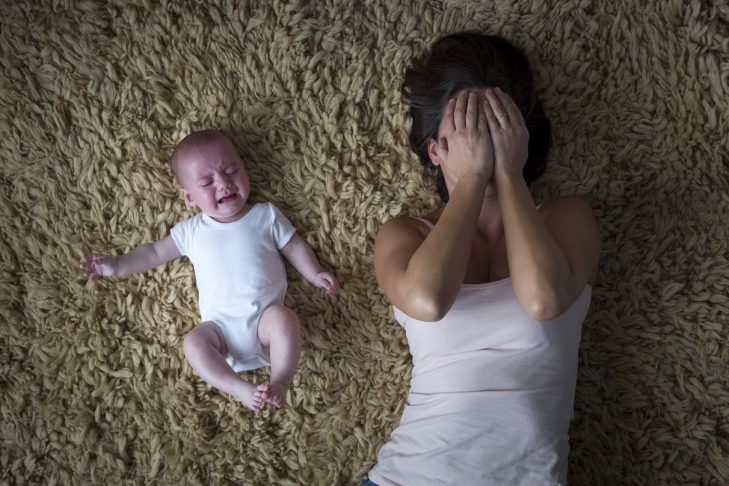Do you ever ask a new mom how she is, and she says something chirpy, like, “Oh! Great! Let’s get together soon!” But you never hear from her? So you assume she’s busy, and you don’t follow up?
Maybe you should. Not because all moms are secretly in trouble: Many really are fine, just busy. But it can’t hurt to reach out, especially this week.
It’s Maternal Mental Health Awareness Week. Four million U.S. women who give birth each year will be affected by a maternal mental health disorder. Yet most doctors don’t screen for these disorders, and it’s estimated that only about 15 percent of those 800,000 women will get the help they need.
I’m one of the fortunate ones. I’ve been on anti-anxiety medication of some kind since I was 19 years old, and I’ve been able to get help for anxiety when I needed it. But I went off of drugs to have both of my kids. After the births of both of my children, my anxiety went haywire. I thought I could be OK “without” help, but I need a combination of therapy and medication. Plenty of people do.
I’ve written about mental health for years and have tried to be as open as possible about my own experiences so that it might help somebody else. Being open has helped me, too.
And so, if you or someone you know needs help, please remember:
1. You are not weak. It takes a lot of energy to maintain a mental health issue while also caring for a small child.
2. Do not judge yourself by what you see on Facebook or other social media. Nobody’s life is “better” or more “together” than yours. Do not compare your insides to somebody else’s outsides or someone else’s highlight reel to your 2 a.m. dark night of the soul.
3. If a friend confides in you that they’re struggling, follow up! A simple, “Hey, how are you doing? Here if you need me!” or “Are you adjusting OK to your medicine?” might make all the difference to someone who feels ashamed, alone, or down. Don’t assume they don’t want to talk about it. If they don’t, they will tell you. If you don’t follow up, they might assume you don’t care about them.
4. It gets better. It really, really does get better. You won’t feel this way forever.
5. Find your support system. Some friends might be good to meet for a drink. Other people might be good for a walk or part of your religious or spiritual community. Others might be the ones you text at 2 a.m. And some might not check in at all. So feel the disappointment, pare that negative energy from your life and move on. Maybe they’re dealing with their own problems.
6. Be a support system. Even if you feel like crap, you will feel 100 percent better if you get up, shower and think about how you can also help someone else. Get out of your own head.
7. Kids need food, diapers and love. Do not worry if you’re not up for going to every parenting class or being uber-mom. Get yourself together. Your infant isn’t judging you.
8. Try to be open. In 2006, I had a full-on nervous breakdown with panic and agoraphobia. As in, had to take a medical leave from two fancy publishing gigs because I literally could not walk out of my house, and stopped showing up at work. I had no choice but to tell people what was going on. The amount of support I received, and the kindness—and the sheer number of people who crawled out of the woodwork to say, “Me, too!”—was astounding. So please, don’t be ashamed. There are 4 million of us (or more) out there. You’re not weird or alone. You have a medical problem, like any other. And there’s help.
And if anyone ever needs a supportive friend or advice or strategies for coping, I’ve been there, and I am still here, and I’m happy to help the next person.
Find more resources here.



